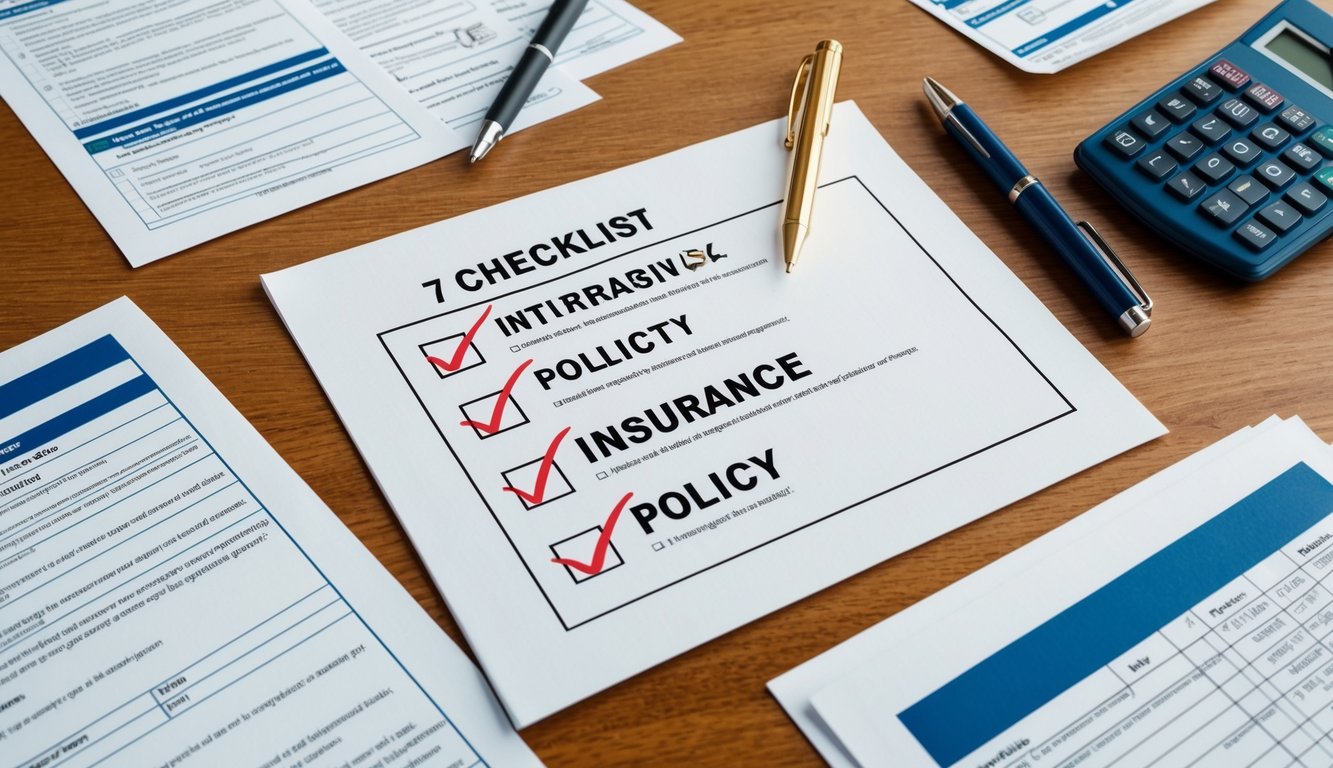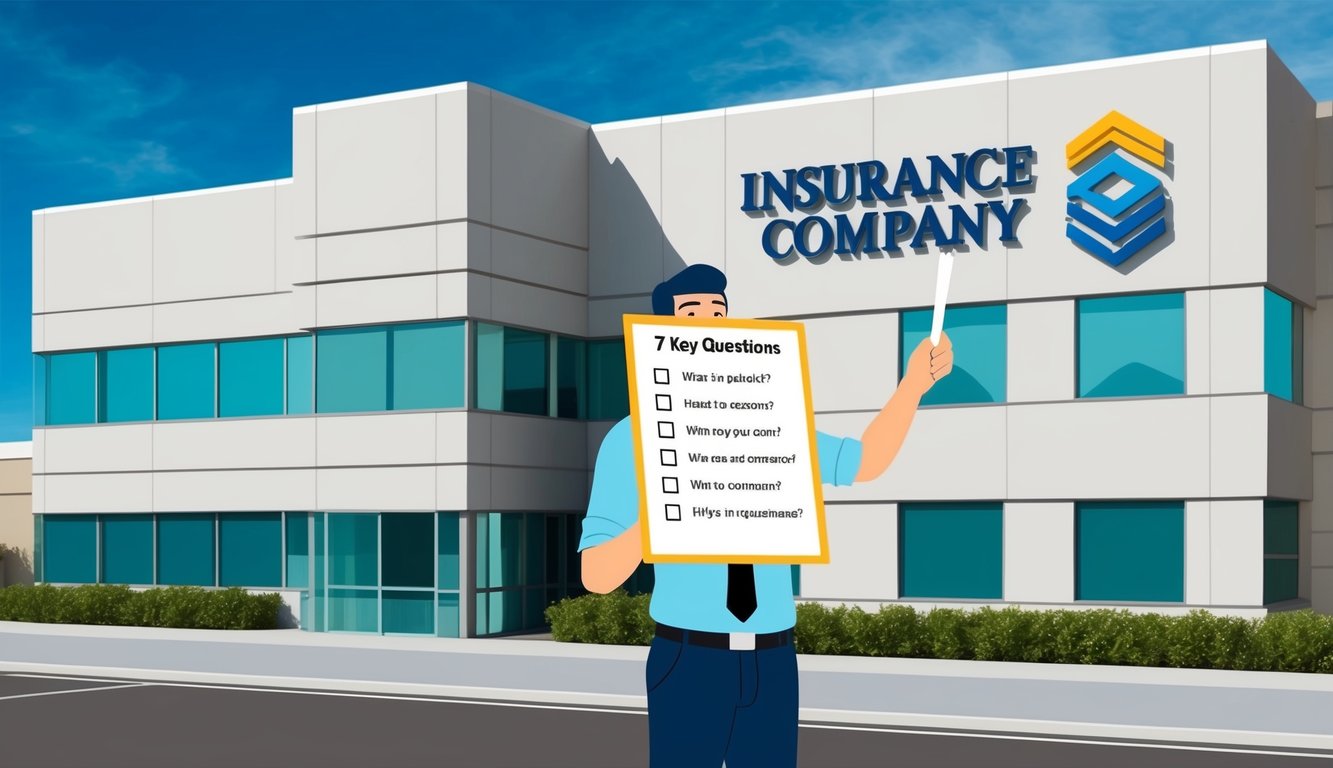Buying insurance can be a daunting task.
There are numerous options and complex policy details to consider.
Before you commit to any insurance policy, make sure to gather the right information.
This will help you make an informed decision.
Asking the right questions can help you understand the coverage, costs, and potential limitations of a policy.
By taking the time to ask key questions, you can ensure that you’re getting the best coverage for your needs and budget. Whether you’re looking for auto, home, life, or any other type of insurance, being prepared with a list of essential questions can help you navigate the process more effectively.
This approach allows you to compare policies more accurately and avoid potential surprises down the road.
1) What types of coverage are included?

When considering an insurance policy, it’s crucial to understand the specific types of coverage included.
Ask your insurance agent to provide a detailed breakdown of what the policy covers.
For homeowners insurance, inquire about protection against fire, theft, and natural disasters.
Find out if the policy includes both dwelling coverage and personal property coverage.
In health insurance, ask about hospitalization, outpatient services, and prescription drug coverage.
Determine if preventive care and specialist visits are included in the policy.
For auto insurance, check if the policy offers comprehensive and collision coverage.
Inquire about liability coverage limits and whether personal injury protection is included.
In life insurance, ask about the difference between term and permanent coverage options.
Understand if the policy includes any riders or additional benefits.
For long-term care insurance, inquire about coverage for in-home care, assisted living facilities, and nursing homes.
Determine if there are any exclusions or waiting periods.
Remember to ask about any additional coverage options that might be relevant to your specific situation.
This could include flood insurance, umbrella policies, or disability coverage.
By thoroughly understanding the types of coverage included, you can ensure that the policy meets your needs and provides adequate protection.
2) What is the claim process?

Understanding the claim process is crucial before purchasing an insurance policy.
The insurance claim process typically begins when you report an incident to your insurance company.
You’ll need to provide details about the event and any resulting damages or losses.
It’s important to document everything thoroughly, including photos and videos if possible.
An insurance adjuster may be assigned to evaluate your claim.
They’ll review the evidence, assess the damage, and determine the amount of compensation you’re entitled to under your policy.
During this time, you might need to provide additional information or documentation to support your claim.
Be prepared to answer questions and cooperate fully with the adjuster.
Once the evaluation is complete, the insurance company will decide whether to approve or deny your claim.
If approved, they’ll offer a settlement amount based on your policy terms and the adjuster’s findings.
If you agree with the settlement, you’ll receive compensation, and the claim will be closed.
If you disagree, you may need to negotiate or appeal the decision.
It’s essential to ask your insurer about specific timeframes for each step of the process.
Some claims may be resolved quickly, while others might take longer, depending on complexity.
Remember to inquire about any deductibles that apply to your policy.
These are amounts you’ll need to pay out of pocket before your insurance coverage kicks in.
3) Are there any exclusions?

Insurance policies often contain exclusions, which are specific situations or risks not covered by your policy.
It’s crucial to ask your agent about these exclusions before purchasing any insurance.
Exclusions vary depending on the type of insurance and policy.
For example, homeowners insurance might exclude damage from floods or earthquakes.
Auto insurance may not cover accidents that occur while driving for a rideshare company.
Understanding exclusions helps you identify potential gaps in your coverage.
You can then decide if you need additional policies or riders to fill these gaps.
For instance, if your homeowners policy excludes flood damage, you might consider purchasing separate flood insurance.
Read your policy documents carefully and ask your agent to explain any confusing terms.
Don’t hesitate to seek clarification on exclusions, as they can significantly impact your coverage.
Some exclusions may be negotiable or removable for an additional premium.
Your agent can guide you on which exclusions are standard and which might be flexible.
This information allows you to make informed decisions about your coverage needs.
Remember, exclusions are designed to limit the insurer’s liability and manage risk.
By understanding them, you can better assess the true extent of your coverage and avoid surprises when filing a claim.
4) What is the premium amount?
The premium amount is a crucial factor to consider when purchasing insurance.
It’s the cost you’ll pay for your coverage, typically on a monthly or annual basis.
Premium costs can vary significantly based on several factors.
Your age plays a role, with younger individuals often securing lower rates.
Your health and lifestyle habits also impact the price.
The type of policy you’re buying affects the premium.
For instance, comprehensive coverage usually costs more than basic plans.
Your deductible amount is another key factor – a higher deductible often means a lower premium.
It’s important to ask about potential discounts that could reduce your premium.
Many insurers offer savings for things like bundling multiple policies or having a clean driving record.
Be sure to inquire about how your premium might change over time.
Some policies have fixed rates, while others may increase as you age or if you make claims.
Remember, while a low premium can be attractive, it’s essential to balance cost with adequate coverage.
Don’t sacrifice necessary protection just to save a few dollars each month.
Lastly, ask about payment options.
Some insurers offer discounts for paying annually instead of monthly, which could lead to overall savings.
5) What is the policy term?
The policy term refers to the duration your insurance coverage remains in effect.
It’s crucial to understand this timeframe to ensure you have protection when you need it most.
For some types of insurance, like auto or homeowners, policies typically last one year.
You’ll need to renew or shop for a new policy annually.
Term life insurance offers more varied options.
You might choose a 10, 20, or 30-year term depending on your needs and budget.
Longer terms generally cost more but provide extended coverage.
Health insurance policies often align with the calendar year, running from January to December.
This timing coincides with many employer-sponsored plans and open enrollment periods.
Some policies, like permanent life insurance, don’t have a set term and remain in force as long as you pay the premiums.
These offer lifelong coverage but usually come with higher costs.
When considering the policy term, think about your long-term needs and financial situation.
A longer term might provide more stability, while a shorter term allows for more frequent reassessment of your coverage needs.
Remember to ask about renewal options and any potential changes in premiums at the end of the term.
This information helps you plan for future expenses and ensures continuous coverage.
6) What are the payment options?
When considering an insurance policy, it’s crucial to understand the available payment options.
Insurance companies typically offer several ways to pay your premiums.
Monthly payments are a common choice.
This option allows you to spread the cost over the year, making it more manageable for your budget.
Some insurers may offer automatic monthly withdrawals from your bank account.
Quarterly or semi-annual payments are another possibility.
These less frequent payments can sometimes result in small discounts compared to monthly payments.
Many insurers offer an annual payment option.
Paying your premium in full for the entire year often comes with a discount.
This can be a good choice if you have the funds available upfront.
Ask about accepted payment methods.
Most insurance companies accept credit cards, debit cards, and electronic funds transfers.
Some may also take checks or money orders.
Inquire about any fees associated with different payment methods.
For example, some insurers charge extra for credit card payments or paper billing.
Don’t forget to ask about grace periods for payments.
Understanding how long you have to pay before your policy lapses can be important in case of unexpected financial difficulties.
By clarifying payment options, you can choose the method that best fits your financial situation and preferences.
7) Is a medical exam required?

When applying for certain types of insurance, you may need to undergo a medical exam.
This is especially common for life insurance policies.
The exam helps insurers assess your health status and calculate their risk.
It typically includes measuring your height, weight, and blood pressure.
The examiner may also collect blood and urine samples for analysis.
Some policies, like guaranteed whole life insurance, don’t require a medical exam.
However, these options are usually more expensive than those that do require an exam.
If an exam is required, you can often schedule it at your home or workplace.
The process usually takes less than 30 minutes.
Preparing for the exam can help ensure accurate results.
You might consider fasting for 8-12 hours before the exam if blood work is involved.
Avoid strenuous exercise and caffeine on the day of the exam, as these can affect your blood pressure readings.
Remember to ask your insurance provider about the exam requirements beforehand.
This will help you understand what to expect and how to prepare properly.
Understanding Policy Coverage
Insurance policies can be complex documents.
Knowing what your policy covers and doesn’t cover is essential for making informed decisions about your insurance needs.
Types of Coverage
Insurance policies offer various types of coverage to protect you against different risks. Auto insurance policies typically include liability, collision, and comprehensive coverage.
Liability protects you if you’re at fault in an accident.
Meanwhile, collision covers damage to your car from crashes, and comprehensive covers non-collision incidents like theft or natural disasters.
Homeowners insurance usually covers your dwelling, personal property, and liability.
Health insurance may include preventive care, hospitalization, and prescription drug coverage.
Lastly, life insurance can provide either term or permanent coverage.
It’s crucial to understand which types of coverage are included in your policy and at what levels.
Ask your agent to explain each type and how it applies to your specific situation.
Inclusions and Exclusions
Every insurance policy has specific inclusions and exclusions that define what is and isn’t covered. Carefully review these details to avoid surprises when filing a claim.
Common inclusions in homeowners policies might be fire damage, theft, and personal liability.
Meanwhile, typical exclusions often include flood damage, earthquakes, and normal wear and tear.
For auto insurance, inclusions usually cover accidents and theft.
Exclusions might include racing or using your vehicle for business purposes without proper coverage.
Ask your agent about any endorsements or riders available to fill coverage gaps.
These add-ons can provide extra protection for specific items or situations not covered by your standard policy.
Evaluating the Insurer’s Reputation

When selecting an insurance policy, it’s crucial to assess the reputation of the insurer.
This involves examining customer feedback and verifying the company’s financial stability.
Customer Reviews
Start by researching customer experiences with the insurance company.
Look for reviews on independent websites and consumer forums.
Pay attention to comments about claim handling, customer service responsiveness, and overall satisfaction.
Check official sources like the National Association of Insurance Commissioners (NAIC) for complaint ratios.
A lower ratio indicates fewer complaints relative to the company’s size.
Consider reaching out to friends, family, or colleagues who have policies with the insurer.
Their firsthand experiences can provide valuable insights into the company’s performance.
Financial Stability
An insurer’s financial strength is critical to ensure they can pay claims when needed.
Check ratings from independent agencies like A.M. Best, Moody’s, or Standard & Poor’s.
These ratings indicate the company’s ability to meet financial obligations.
Look for insurers with high ratings (A or above) for better security.
Visit the insurer’s website to review their annual reports and financial statements.
Pay attention to key metrics like assets, liabilities, and net income.
Consider the company’s longevity in the industry.
Insurers with a long history often demonstrate financial stability and resilience through various economic cycles.






